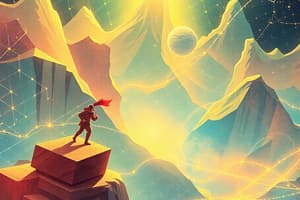Podcast
Questions and Answers
What is the primary focus of macroeconomics?
What is the primary focus of macroeconomics?
- Distribution of goods and services
- Social well-being and prosperity
- Decision-making in individual markets
- National GDP and economic stability (correct)
How is Gross Domestic Product (GDP) defined?
How is Gross Domestic Product (GDP) defined?
- The total monetary value of imports and exports
- The total monetary value of all goods sold in a country
- The total monetary value of all final goods and services produced within a country's borders in a specific time period (correct)
- The total monetary value of all goods produced globally
What does the unemployment rate measure?
What does the unemployment rate measure?
- The percentage of people employed in government jobs
- The percentage of people working part-time
- The percentage of people not seeking employment
- The percentage of people in the labor force who are unemployed (correct)
In macroeconomics, what is inflation?
In macroeconomics, what is inflation?
What is one of the key objectives of economists regarding unemployment and inflation?
What is one of the key objectives of economists regarding unemployment and inflation?
Why is Gross Domestic Product (GDP) considered a crucial barometer of an economy's health?
Why is Gross Domestic Product (GDP) considered a crucial barometer of an economy's health?
What do business cycles in macroeconomics refer to?
What do business cycles in macroeconomics refer to?
Which tool involves the government's use of taxation and spending to influence the economy?
Which tool involves the government's use of taxation and spending to influence the economy?
How does monetary policy influence the economy?
How does monetary policy influence the economy?
What role does international trade play in macroeconomics?
What role does international trade play in macroeconomics?
What is one of the challenges faced in macroeconomics due to economic models?
What is one of the challenges faced in macroeconomics due to economic models?
Why are economic policies considered to have limitations?
Why are economic policies considered to have limitations?
Study Notes
Understanding Economics: Exploring Macroeconomics
Economics is a vast field that examines the production, distribution, and consumption of goods and services, aiming to answer essential questions about our well-being and prosperity. While microeconomics focuses on individual markets and decision-making, this article will delve into the world of macroeconomics, which concerns itself with the broader landscape that encompasses the entire economy—from how our national Gross Domestic Product (GDP) is calculated to the strategies governments implement for economic stability.
GDP and National Income
Macroeconomics relies heavily on the understanding of a country's aggregate output, commonly measured by the Gross Domestic Product (GDP). GDP is the total monetary value of all final goods and services produced within a country's borders in a specific time period. It is a crucial barometer of an economy's health, indicating the level of overall economic activity and the standard of living within a nation.
Unemployment and Inflation
Two of the most important indicators of macroeconomic health are unemployment and inflation. Unemployment is the percentage of the labor force that is actively seeking work but cannot find employment, while inflation is the rate at which the general level of prices for goods and services is rising. Economists aim to maintain a balance between these two variables, generating full employment while preventing excessive inflation.
Business Cycles
In the context of macroeconomics, business cycles refer to the fluctuations in economic activity over time. These cycles generally follow a trend of expansion (economic growth) and contraction (recession). Understanding these cycles is crucial for developing economic policies that can help mitigate economic downturns and promote overall growth.
Fiscal and Monetary Policy
Two primary tools available to governments for managing macroeconomic conditions are fiscal policy and monetary policy. Fiscal policy deals with the government's use of taxation and spending to influence the economy. For instance, during a recession, the government might increase spending or decrease taxes to stimulate demand and promote growth. Monetary policy, on the other hand, involves actions by the central bank to influence the money supply, interest rates, and hence, the overall level of economic activity. By adjusting interest rates, the central bank can impact borrowing and spending, which, in turn, can influence economic growth and inflation.
International Trade and Exchange Rates
International trade plays a significant role in macroeconomics, as it highlights the global interconnectedness of economies. In addition to trade, exchange rates are another crucial aspect of the global economy—they represent the relative value of one country's currency in terms of another. Exchange rates can have a profound impact on trade, foreign investment, and inflation.
Challenges and Limitations
Macroeconomics is a complex and ever-evolving field, with numerous challenges and limitations. For instance, the behavior of individuals and businesses can be difficult to predict, and economic models may not always account for all relevant factors. Moreover, economic policies can have unintended consequences—for example, a policy aimed at reducing unemployment might also lead to inflation. Achieving equilibrium in the economy is an ongoing challenge, requiring constant monitoring and adaptation to new information and unforeseen events.
In conclusion, macroeconomics is a field that can seem overwhelming at first glance. However, by understanding fundamental concepts such as GDP, inflation, and unemployment, as well as the tools used by economists and governments to manage the economy, we can gain a more comprehensive understanding of the forces that shape our economic well-being. As the world continues to evolve, so too will the complex and fascinating realm of macroeconomics.
Studying That Suits You
Use AI to generate personalized quizzes and flashcards to suit your learning preferences.
Description
Delve into the world of macroeconomics, exploring fundamental concepts such as GDP, inflation, unemployment, and the tools governments use to manage economic conditions. Gain insights into international trade, business cycles, fiscal and monetary policy, and the challenges faced in this complex field.




